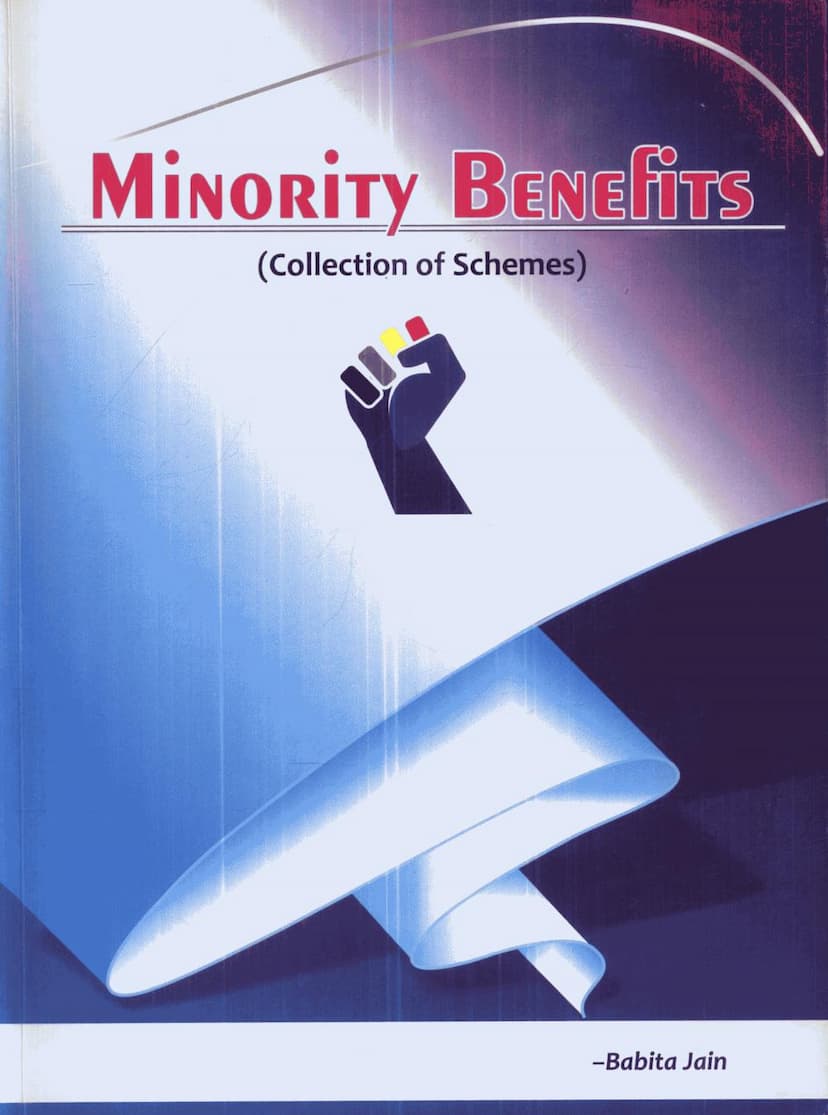Minority Benefits
Added to library: September 2, 2025

Summary
"Minority Benefits: Collection of Schemes" by Babita Jain, published by Shrut Samvardhan Sansthan in 2017, is a compilation of various government schemes and initiatives aimed at the welfare and upliftment of minority communities in India, with a particular focus on providing information to the Jain community.
The book was published on the auspicious occasion of the Pancham Acharya Padarshan Diwas of His Holiness Acharya 108 Shri Gyansagar Ji Maharaj. The publication was made possible through the efforts of Babita Jain, who compiled the information from various sources. The publisher, Shrut Samvardhan Sansthan, is dedicated to preserving and publishing rare holy scriptures and honoring scholars.
Key Themes and Content:
- Jain Community as a Minority: The book highlights that the Jain community was officially notified as a minority community on January 27, 2014. This status entitles individuals and institutions of the Jain community to various benefits and schemes provided by the central and state governments for minority upliftment.
- Purpose of the Book: The primary objective of the book is to disseminate crucial information about minority benefits to the Jain community and the broader public. It aims to raise awareness so that eligible individuals and institutions can leverage these schemes for financial assistance, scholarships, grants, and other forms of support.
- Government Schemes and Programs: The book details a wide array of schemes, categorized for clarity. These include:
- Educational Opportunities: Schemes related to pre-matric, post-matric, and merit-cum-means scholarships, coaching for competitive exams, interest subsidies for overseas studies ("Padho Pardesh"), and infrastructure development for minority educational institutions.
- Economic Activities and Employment: Programs for self-employment, skill development ("Seekho Aur Kamao," "USTTAD"), wage employment, and enhanced credit support through institutions like the National Minorities Development and Finance Corporation (NMDFC).
- Social Welfare and Infrastructure: Schemes related to housing, slum improvement, and welfare of minorities.
- Legal and Constitutional Safeguards: Information on the rights of minority educational institutions, procedures for obtaining minority status certificates, and the role of the National Commission for Minority Educational Institutions (NCMEI).
- Prime Minister's New 15 Point Programme: A significant portion of the book is dedicated to explaining the provisions of this program, which aims to ensure equitable benefits for minorities in various sectors like education, employment, and living conditions.
- Specific Schemes Detailed: The book extensively covers schemes such as:
- National Means-cum-Merit Scholarship Scheme
- IDMI (Infrastructure Development of Minority Institutions)
- Pre-Matric, Post-Matric, and Merit-Cum-Means Scholarship Schemes (Ministry of Minority Affairs)
- Maulana Azad Education Foundation (MAEF) schemes (including scholarships for girls and literacy awards)
- National Minorities Development and Finance Corporation (NMDFC) schemes (Term Loan, Educational Loan, Micro Financing, Mahila Samridhi Yojana)
- Maulana Azad National Fellowship and Scholarship Schemes
- Nai Udaan, Padho Pardesh, Nai Roshni, Hamari Dharohar, USTTAD, and Learn & Earn schemes.
- State-specific scholarship schemes from Delhi, Andhra Pradesh, Chandigarh, Karnataka, Jammu & Kashmir, Kerala, and Sikkim are also included.
- Scholarships offered by Public Sector Undertakings (PSUs) like NTPC and ONGC, NGOs, and trusts are also listed.
- Author's Contribution: Babita Jain, a teacher with a passion for writing and social work, compiled this information to empower the community. Her efforts are supported by Acharya Gyansagar Ji Maharaj and the Shrut Samvardhan Sansthan. The book emphasizes the need for community awareness and utilization of these rights for socio-economic upliftment.
In essence, "Minority Benefits" serves as a comprehensive guide for minority communities, particularly the Jain community, to understand and access the various governmental support systems available to them, promoting education, economic empowerment, and overall development.